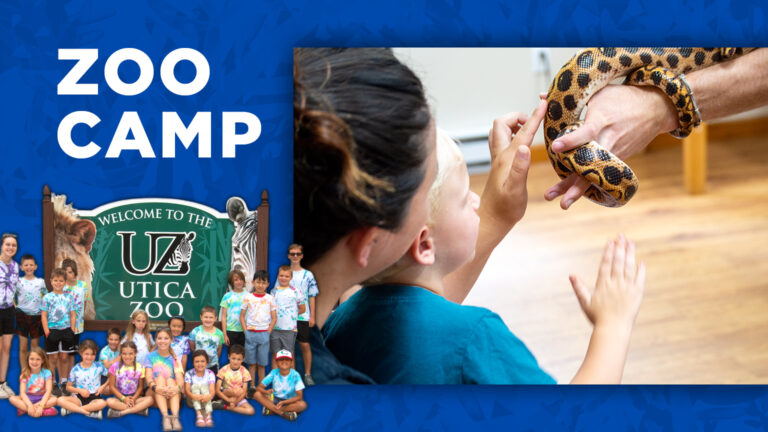
Looking for something fun for your kids to do during school break? Bring them to the Utica Zoo for our school break zoo camp!
Zoo camp is a great place for students to have fun and learn too! We introduce campers to an inquiry-based learning environment, with STEAM activities that encourage group collaboration and learning. Camps are interactive and also include an animal meet and greets, enrichment projects, touring the zoo, and crafts.
Please note: PRE-REGISTRATION REQUIRED FOR ALL CAMP SESSIONS! This is a drop-off style program. Sign-in and out will be required for drop off and pick up. Parents wishing to remain on zoo grounds while their child enjoys zoo camp will be required to pay admission.
Zoo Camp Dates & Topics
Pre-K Sessions (Campers ages 3-5 years old)
*Campers must be able to independently use the restroom in order to attend*
Preschool Paleontology
Monday, July 1 – Wednesday, July 3 | 9 am – 12 pm
All about the fascinating world of dinosaurs! Learn about what they ate, where they lived and much more!
AZA Hot Topic: STEM, and Connecting to Nature
Animal Rhyme Time
Monday, August 26 – Friday, August 30 | 9 am – 3 pm
Learn about a variety of animals and their lifestyles through the use of nursery rhymes and storybooks!
Learning Standard: K-LS1-1. Use observations to describe patterns of what plants and animals (including humans) need to survive. [Clarification Statement: Examples of patterns could include that animals need to take in food but plants do not; the different kinds of food needed by different types of animals; the requirement of plants to have light; and that all living things need water and other materials to live, grow, and thrive.]
Kindergarten & 1st Sessions (Campers ages 5-7 years old)
Coloriffic
Monday, July 8 – Friday, July 12 | 9 am – 12 pm
Dive into the use of colors and patterns in wildlife! Learn about how plants and animals use colors and patterns to their advantage in their lives!
Learning Standard:P-LS1-2. Plan and conduct an investigation to determine how familiar plants and/or animals use their external parts to help them survive in the environment. [Clarification Statement: Emphasis should be on the relationships between the physical and living environment. Examples of external parts could include roots, stems, leaves for plants and eyes, ears, mouth, arms, legs for animals.]
Habitat Hopping
Monday, July 8 – Friday, July 12 | 1 pm – 4 pm
Learn about a variety of different habitats all over the world and the types of plants and animals that live in each!
Learning Standard: 2-LS4-1. Make observations of plants and animals to compare the diversity of life in different habitats. [Clarification Statement: Emphasis is on the diversity of living things in each of a variety of different habitats.] [Assessment Boundary: Assessment does not include specific animal and plant names in specific habitats.]
Nice to Eat You
Monday, August 5 – Friday, August 9 | 9 am – 3 pm
Discover the different types of diets animals
eat and how animals are designed to have those certain diets!
Learning Standard: K-LS1-1. Use observations to describe patterns of what plants and animals (including humans) need to survive. [Clarification Statement: Examples of patterns could include that animals need to take in food but plants do not; the different kinds of food needed by different types of animals; the requirement of plants to have light; and that all living things need water and other materials to live, grow, and thrive.]
2nd & 3rd Grade (Campers ages 7-9 years old)
Animals on Guard
Monday, July 15 – Friday, July 19 | 9 am – 12 pm
Learn about different defense mechanisms a variety of animals have that they use in their daily lives!
Learning Standard: 3-LS4-2. Use evidence to construct an explanation for how the variations in characteristics among individuals of the same species may provide advantages in surviving, finding mates, and reproducing. [Clarification Statement: Examples of cause and effect relationships could include plants that have larger thorns than other plants may be less likely to be eaten by predators; and, animals that have better camouflage coloration than other animals may be more likely to survive and therefore more likely to produce offspring.]
Conquest and Consequences
Monday, August 12 – Friday, August 16 | 9 am – 3 pm
Dive into the world of invasive and endangered
species! How do they affect each other and what can we do to help?
AZA Hot Topic: Human Wildlife Coexistence and Wildlife Trafficking
4th & 5th Grade (Campers ages 9-11 years old)
Who’s Who in the Zoo
Monday, July 22 – Friday, July 26 | 9 am – 3 pm
Learn all about the different jobs at the zoo, and how each is unique and important to keep the zoo running!
AZA Hot Topic: Careers
New York Natives
Monday, August 19 – Friday, August 23 | 9 am – 12 pm
Learn about the different plants and animals that are in New York that make it so special! Also dive into how we can help protect these species to keep them here!
AZA Hot Topic: Connecting to Nature and Human Wildlife Coexistence
SUNY Poly Camp: Middle - Highschool Students
Biodiversity Bonanza
Monday, July 15 – Thursday, July 18 | 1 pm – 4 pm (@ SUNY Poly)
It’s no secret that planet Earth is full of life, which takes on an almost uncountable number of forms. Archaea, plants, animals, fungi, bacteria…each group has its own unique characteristics that distinguish them from one another, yet each is necessary to protect the balance of nature.
This STEM based camp will explore the similarities and differences between these groups, as well as building a foundational understanding of where these organisms live and why. Each day, we will discuss topics such as biodiversity hotspots, shifting climatic conditions, island endemics, invasive species, human impact, and more. A daily live-animal presentation will help to reinforce student’s learning of topics covered that day. This will most likely include a rainbow boa, prehensile-tailed skink, turtle, touch-me-not stick insect, and a mammal. Each animal will go along with the specific theme for each day of the camp. The camp will then culminate in an active, engaging, bio-blitz of the SUNY Poly campus, to gain an understanding of which species might even be calling central New York home.
Learning Standards:
MS-LS2-5. Evaluate competing design solutions for maintaining biodiversity and protecting ecosystem stability.* [Clarification Statement: Examples of ecosystem protections could include water purification, waste management, nutrient recycling, prevention of soil erosion, and eradication of invasive species. Examples of design solution constraints could include scientific, economic, and social considerations.]
HS-LS2-2. Use mathematical representations to support and revise explanations based on evidence about factors affecting biodiversity and populations in ecosystems of different scales. [Clarification Statement: Examples of mathematical representations could include finding the average, determining trends, and using graphical comparisons of multiple sets of data.] [Assessment Boundary: Assessment is limited to provided data.]
HS-LS2-7. Design, evaluate, and refine a solution for reducing the impacts of human activities on the environment and biodiversity.* [Clarification Statement: Examples of human activities could include urbanization, building dams, and dissemination of invasive species. Examples of solutions could include simulations, product development, technological innovations, and/or legislation.]
Parent to Parent Camp in partnership with The Kelberman Center (Tailored for children aged 8-13 with autism)
Animals and Art
Monday, August 19 – Friday, August 23 | 1 pm – 4 pm
Investigate different animals’ colors and patterns and how those animals use them in their daily lives!
Zoo Crew (Children & Teens ages 14-17 years)
Monday, June 24 – Friday, June 28 | 9 am – 1 pm
Have you always wanted to work in a zoo? The Zoo Crew Program at the Utica Zoo is an exciting way for high school students ages 14 to 17 to explore career opportunities, meet new friends, gain customer service skills, and much more!
Our Zoo Crew members are valuable volunteers who help educate the public about the zoo and its efforts. The Zoo Crew training course is designed to train your child to become an effective and independent zoo volunteer that is capable of interpreting their environment successfully.
This course is held over a period of five consecutive days and will cover a different zoo topic each day.
The fees for each program will cover any/all materials that will be handed out during or after the course is completed, a t-shirt, name badge, plus many other fun activities that the kids get to enjoy during the course!
Jr. Zoo Crew (Children ages 12-14 years)
Monday, July 29 – Friday, August 2 | 9 am – 3 pm
Our Jr. Zoo Crew course is designed just like our
regular zoo camps but will explore the zoo, its animals, and critical
conservation issues in greater detail. It is held over a period of five
consecutive days, with each day focusing on a different zoo topic. Those that
attend the Jr. Zoo Crew course will receive vital information that will be
helpful when they go on to join the Zoo Crew volunteer program. Completion of
the Jr. Zoo Crew training course also qualifies those that successfully
attended to shadow some of the Utica Zoo’s educational programs throughout the
year.
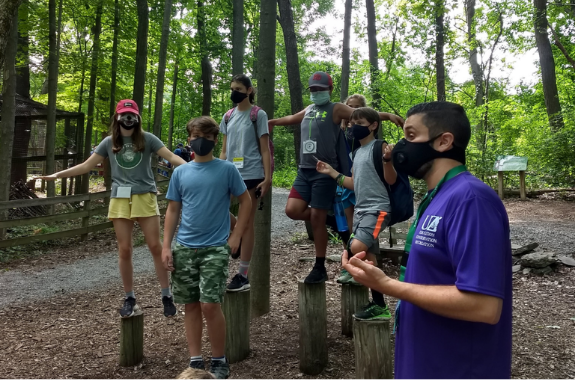
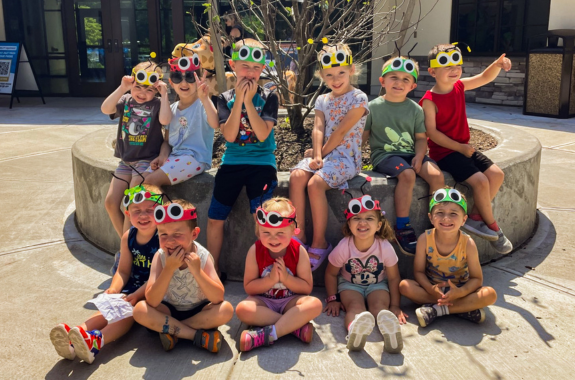
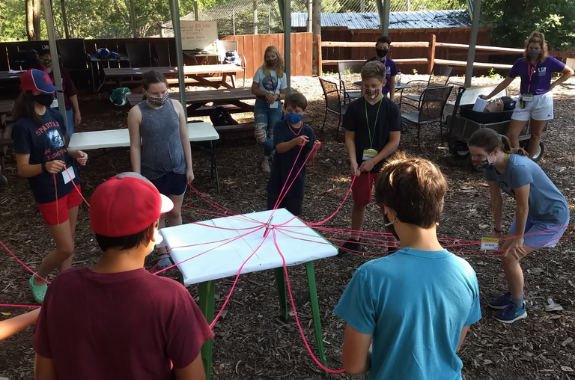
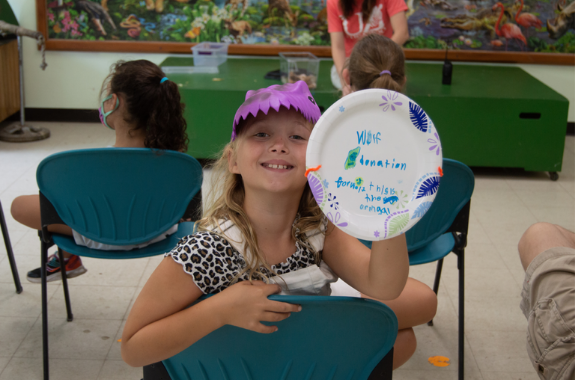
Rates
-
Single Day Sessions $55.00 for members/$65.00 for not-yet-members
-
Half Day/Half Week Sessions $100.00 per camper for members/$115.00 per camper for not-yet-members
-
Half Day/Full Week Sessions $150.00 per camper for members/$175.00 per camper for not-yet-members
-
Full Day/Full Week Sessions $200.00 per camper for members/$225.00 per camper for not-yet-members
-
UZ & U Family Camp $250/family
Your camper’s age must be within the age range for the camp session by the first day of camp. Registration is on a first come, first serve basis, with limited space available per session. All zoo camp registrations must go through our online booking system. Using the calendars below each session, choose the dates of the camp you would like to register for and follow the on-screen prompts to complete your registration!
- Full payment will be due upon registration. Our camp sessions do fill up quickly so if the session you’d like to sign up for is full, please contact us to be put on the waitlist.
Questions may be sent to zak.hughes@uticazoo.org or 315-738-0472 ext. 36
Cancellation Protocol
If you need to cancel your reservation for any reason, we must be contacted at least 14 days prior to the camp start date in order to be eligible for a refund. There is a $25 non-refundable convenience fee charged for each transaction. If you cancel less than 14 days prior to the first day of your camp session, your registration fee is non-refundable, unless the class is canceled by zoo staff. Please notify zoo camp staff if your child will be unable to attend, is arriving late, or leaving early on any particular day of zoo camp.
